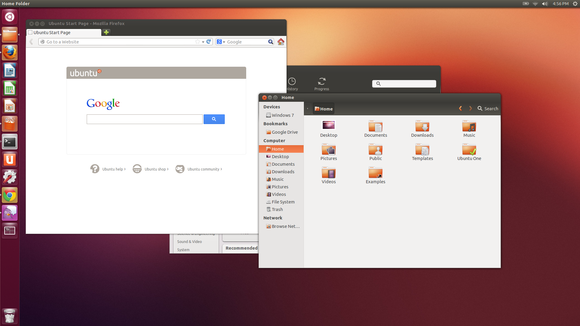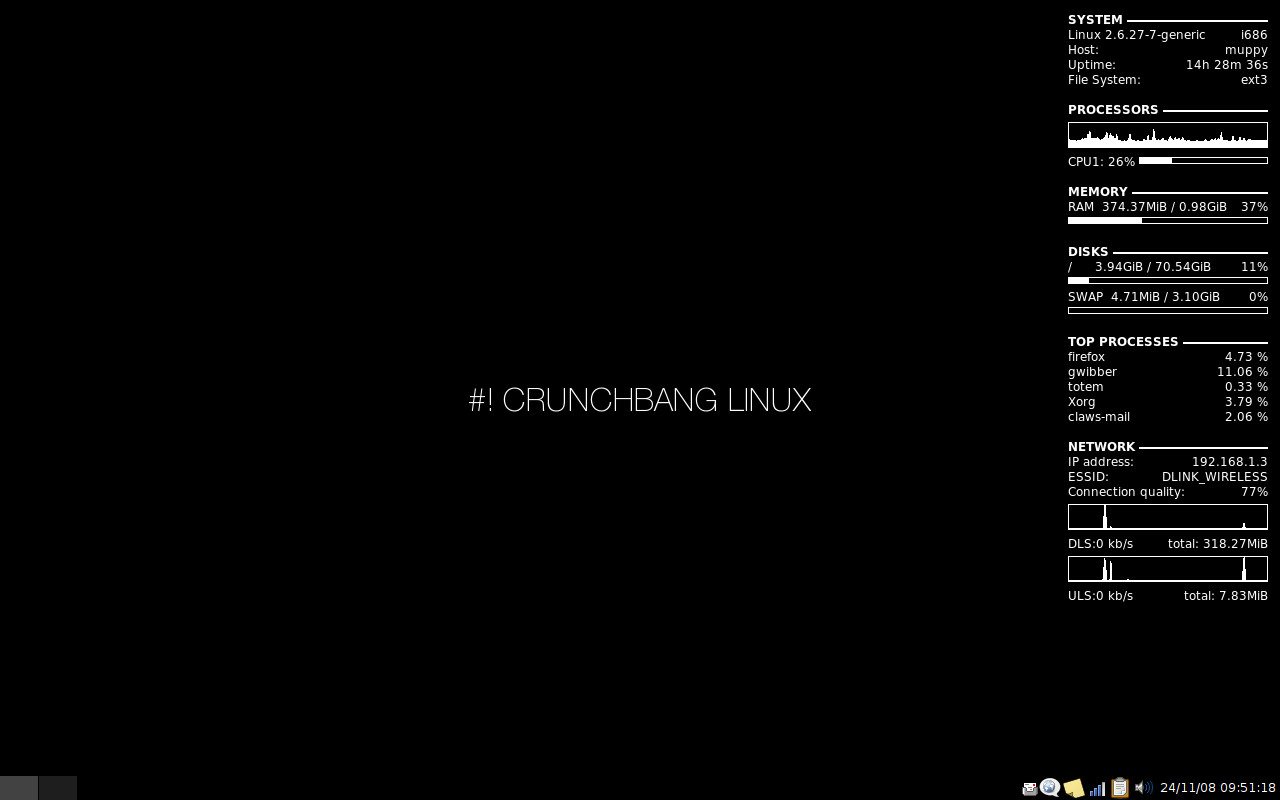ProsThe biggest benefit of choosing Linux is cost. Most Linux distributions are free, as are the applications available to run on it.
Linux tends to be less of a resource hog than other platforms, and it can perform admirably on older processors and with less RAM or hard-drive storage than Windows or OS X. You can choose from various user interface desktop environments, such as KDE and GNOME, and if you like you can install or create a desktop environment that is virtually identical to Windows XP.
Linux has made great progress from its hobbyist roots and now comes preloaded on some machines from Acer, Asus, and Dell.
Like Mac OS X, Linux can run Windows in dual-boot or virtual-machine form. Tools like WINE (Wine Is Not an Emulator) can run Windows software natively within Linux. (Note: WINE is a compatibility layer that converts Windows “calls” rather than emulating them; hence its name.)
Cons
You’ll have to replace all the applications you use, and you’ll have to hunt down software and drivers for your printer, wireless network adapter, and other peripheral devices—or replace them with Linux-compatible equivalents.
The fact that Linux is open-source can be a double-edged sword with regard to support and troubleshooting. In most cases, you simply download software from an open-source project, and there’s no “parent company” to turn to for support. Some Linux variants do offer support options that you can buy. The upside is that everything you need to know is available online—and plenty of forums exist, populated by Linux experts who are willing to lend a hand.
1 posted on
12/18/2013 6:48:47 AM PST by
ShadowAce
Navigation: use the links below to view more comments.
first 1-20, 21-25 next last
To: rdb3; Calvinist_Dark_Lord; Salo; JosephW; Only1choice____Freedom; amigatec; Still Thinking; ...
2 posted on
12/18/2013 6:49:14 AM PST by
ShadowAce
(Linux -- The Ultimate Windows Service Pack)
To: ShadowAce
If you want a Linux-type experience with Windows, there’s always Sever Core.
To: ShadowAce
you’ll have to hunt down software and drivers for your printerHP printers are the way to go with Linux. HP's Linux drivers are actually much better than their Windows drivers, which tend to be bloated resource-hogging messes.
9 posted on
12/18/2013 7:01:13 AM PST by
EricT.
(ARBEIT MACHT FREI- now get back to work you taxpaying peasant!)
To: ShadowAce
Windows 7 works and can be made to emulate XP if wanted... and I hate win 8 more than I did ME. Amazon will sell you all of the copies of 7 that you want.
10 posted on
12/18/2013 7:03:21 AM PST by
LibLieSlayer
(FROM MY COLD, DEAD HANDS! BETTER DEAD THAN RED!)
To: ShadowAce
My task for xmas break is to get my pc desktop running both osx and win7.
Should be fun
11 posted on
12/18/2013 7:03:37 AM PST by
Zathras
To: ShadowAce
If you want to “try it before you commit to it” you can use Oracles VirtualBox virtual machine. I think there are blobs that preclude installing Linux, just download, click and go.
13 posted on
12/18/2013 7:10:01 AM PST by
867V309
(Obama- he's just crazy enough to do it.)
To: ShadowAce
14 posted on
12/18/2013 7:11:07 AM PST by
USNA74
To: ShadowAce
If you have a computer running XP, it probably doesn't have the hardware required to run Windows 8.0/8.1.
You can either throw it away or give an alternative operating system a whirl, especially if all you do is email and web.
15 posted on
12/18/2013 7:14:50 AM PST by
E. Pluribus Unum
(Who knew that one day professional wrestling would be less fake than professional journalism?)
To: ShadowAce
For anyone who has an orphaned netbook gathering dust in a corner because it runs like a dog using Windows Crippled, I suggest Lubuntu. Makes it very usable. I put it on using Universal-USB-Installer.
17 posted on
12/18/2013 7:16:52 AM PST by
Stentor
To: ShadowAce
I just bought an Acer laptop w/Windows 7 as a back up to this higher quality HP (also w/Windows 7). I really don’t want to change to Windows 8 as I hear is bites hard.
To: ShadowAce
Macs are not that user-friendly. Coming from a Windows environment, you will take a while to find/get used to all their quirks and whatnot.
The biggest issue, too, is they don’t like supporting 16:9. I work in a tech environment, providing av services for corporate events. And a lot of macs will not output 720p. They’ll do 1280x800, but require processing to restretch it to 720 (which is the format a lot of shows use). Granted, I do think that 16:10 is a much better and user-appealing aspect ratio, but the fact that many Macs don’t allow 16:9 is very annoying. Also, that they change their video out every model update (and charge like crazy for adapters) is just asinine.
Linux is great, and I dual-boot with it, but the lack of compatibility with many programs is very frustrating. Macs had this issue as well until a couple years ago. Yes, there are knock-offs (OpenOffice), but sometimes those can be hard to find or not work the same. However, as Linux is growing these issues are starting to go away (THANK YOU STEAM THANK YOU THANK YOU).
Windows 8 really isn’t too bad, AFTER you install Classic Shell. When I first got my new Win8 laptop, I couldn’t even figure out how to shut it down. Had to grab my old laptop and download CShell. It basically lets you have the quick Win8 backend, with a good Win7 style gui.
To: ShadowAce
You’ll have to replace all the applications you use, and you’ll have to hunt down software and drivers for your printer, wireless network adapter, and other peripheral devices
A show stopper for probably 85% of PC users.
24 posted on
12/18/2013 7:34:23 AM PST by
oh8eleven
(RVN '67-'68)
To: ShadowAce
Windows 8.1 has all the features of Windows XP and Windows 7, and will run on most legacy hardware. And there is a free Start menu replacement that works perfectly on Windows 8.1, and the user can choose a Windows 7 or Windows XP style.
So, my suggestions are to install Windows 8.1, then Classic Shell (
http://classicshell.net), and after that, quit complaining so much.
28 posted on
12/18/2013 7:39:59 AM PST by
SunStar
(Democrats piss me off!)
To: ShadowAce
Cons You’ll have to replace all the applications you use, and you’ll have to hunt down software and drivers for your printer, wireless network adapter, and other peripheral devices—or replace them with Linux-compatible equivalents.
Well at least someone is honest.
32 posted on
12/18/2013 7:57:38 AM PST by
McGruff
(How's that Hopey Changey thingy workin out for ya?)
To: ShadowAce
You’ll have to replace all the applications you use Not entirely true. Especially if you're coming from a Windows XP environment, WINE stands a pretty good chance of running much of your old software - granted, the focus tends to be on games, but WINE should work for other PC applications as well.
38 posted on
12/18/2013 8:19:44 AM PST by
kevkrom
(It's not "immigration reform", it's an "amnesty bill". Take back the language!)
To: ShadowAce
39 posted on
12/18/2013 8:21:10 AM PST by
editor-surveyor
(Freepers: Not as smart as I'd hoped they'd be)
To: ShadowAce
I have been using
KUBUNTU and it is stable and very easy to use for surfing and email. It installs easily and is FREE.
I have recovered some old DELL computers and brought them back to life with KUBUNTU. There are many free software packages available and the install loads most every software package you would need. FireFox is installed and one can easily install Thunderbird (email) and VLC (free media player).
My current setup is a dual boot with KUBUNTU and Windows XP Pro.
Good Hunting... from Varmint Al
To: ShadowAce
I retired my 10 year old Dell XP and purchased a new Dell that comes with 8.0 installed. The upgrade to 8.1 was a little bit of a problem because there is an issue with the upgrade tile not appearing in the Windows store. I had Dell phone support solve the problem. It took the tech an hour to resolve. They sent me the 8.1 update.It took two hours to download and then an hour to install.
8.1 allows you to install Office 2003 which 8.0 did not. I had to download an 8.1 driver for my Brother printer along with a program to uninstall the old version of the driver which was part of the 8.0 system.
8.0 defaults to McAfee which I do not use. The 8.1 upgrade replaced McAfee with the new Windows Defender
Overall I like 8.1
41 posted on
12/18/2013 8:28:49 AM PST by
UB355
(Slower traffic keep right)
To: ShadowAce
This again? How many of these “Switch to Linux” threads are you going to post? Seems like once a week. Linux sucks, has always sucked, and still sucks. Only a nerd worships at the alter of an OS.
47 posted on
12/18/2013 8:43:54 AM PST by
CodeToad
(When ignorance rules a person's decision they are resorting to superstition.)
To: ShadowAce
Anything past Ubuntu 12.10 runs like a dog on older systems. I ran it on this laptop, a Core duo 1.8mhz with 2GB RAM and a 256GB SSD w/a older Nvidia card and it was ok.
Crunchbang Linux is about 1000x faster.

48 posted on
12/18/2013 8:59:59 AM PST by
gura
(If Allah is so great, why does he need fat sexually confused fanboys to do his dirty work? -iowahawk)
Navigation: use the links below to view more comments.
first 1-20, 21-25 next last
FreeRepublic.com is powered by software copyright 2000-2008 John Robinson


